- Home
- Hanif Kureishi
Midnight All Day Page 2
Midnight All Day Read online
Page 2
‘Let’s not.’
‘Archie –’
Her voice sounds forced and dull, as if she is about to weep. How long do I intend to sit here? My mind whirls; I have forgotten who I am. I imagine catastrophes and punishments everywhere. I suppose it was to cure myself of such painful furies that I become depressed so often. When I am depressed I shut everything down, living in a tiny part of myself, in my sexuality or ambition to be an actor. Otherwise, I kill myself off. I have talked to Florence about these things – about ‘melancholy’ as she puts it – and she understands it: the first person I have known who does.
I realise that if I peep around the arm of the sofa I can see Florence from the side, perched on a stool. I move a little; now she is in full view, wearing a tight white top, cream bags and white sandals.
Oddly, I am behaving as if this man has stolen my woman. In fact it is I who have purloined his, and if he finds out, he could easily become annoyed and perhaps violent. But I gaze and gaze at her, at the way she puts her right hand across her face and rests the back of her hand on her cheek with her fingers beneath her eye; a gesture she must have made as a child, and will probably make as an old woman.
If Archie is a ruling presence in our lives, he is an invisible one; and if she behaves a little, let’s say, obscurely, at times, it is because she lives behind a wall I can only listen at. She is free during the day but likes to account for where she is. He would have been more than satisfied with, ‘I spent the afternoon at the Tate,’ and could endure with less about its Giacomettis. When we separate at the end of each meeting she often becomes agitated and upset.
I assumed that I did not care enough about her to worry about her husband. It never occurred to me that she and I would live together, for instance; we would continue casually until we fell out. Nevertheless, watching her now, I am not ready for that. I want her to want me, and me alone. I must play the lead and not be a mere walk-on.
The barmaid comes and picks up my glass. ‘Can I get you something else?’
‘No thanks,’ I say in a low voice.
I notice that Florence raises her head a little.
‘Did you enjoy your meal?’ says the barmaid.
‘Yes. Particularly the fish. The vegetables were just right. Not overcooked and not raw.’ Then I say, ‘When does the bar close?’
‘Thursday!’ she says, and laughs.
Without looking at Florence or her husband, I follow her out of the room and lean tiredly across the bar.
‘What are you doing down here?’ She says this as if she’s certain that it is not my kind of place.
‘Only relaxing,’ I say.
She lowers her voice. ‘We all hate it down here. Relaxing’s all there is to do. You’ll get plenty of it.’
‘What do you like to do?’
‘We used to play Russian roulette with cars. Driving across crossroads, hoping that nothing is coming the other way. That sort of thing.’
‘What’s your name?’
‘Martha.’
She puts my drink down. I tell her my room number.
‘That’s all right,’ she says. Martha leans towards me. ‘Listen –’ she says.
‘Yes?’
Florence’s husband sits heavily on the stool beside me and shifts about on it, as he is trying to screw it into the floor. I scuttle along a little.
He turns to me. ‘All right if I sit down?’
‘Why not?’
He orders a cigar. ‘And a brandy,’ he says to Martha. He looks at me before I can turn my back. ‘Anything for you?’
I start to get up. ‘I’m just off.’
‘Something I said?’ He says, ‘I saw you in the train.’
‘Really? Oh yes. Was that your wife?’
‘Of course.’
‘Is she going to join us?’
‘How do I know? Do you want me to ring the room?’
‘I don’t want you to do anything.’
‘Have a brandy.’ He lays his hand on my shoulder. ‘I say, barmaid – a brandy for this young man!’
‘Right,’ I say. ‘Right.’
‘Do you like brandy?’ she says to me, kindly.
‘Very much,’ I say.
He drags his tie off and stuffs it in his jacket pocket.
‘Sit down,’ he says. ‘We’re on bloody holiday. Let’s make the most of it! Can I ask your name?’
*
I met Florence nearly a year ago in a screening room, where we were the only people viewing a film made by a mutual friend. She lay almost on her back in the wide seat, groaning, laughing and snorting throughout the film. At the end – before the end, in fact – she started talking about the performances. I invited her for a drink. After leaving university, she was an actress for a couple of years. ‘It was a cattle-market, darling. Couldn’t stand being compared to other people.’
Yet a few days after we met, she was sitting crosslegged on the floor in my place, as my flatmates wrote down the names of casting directors she suggested they contact. She fitted easily into my world of agents, auditions, scripts, and the confusion of young people whose life hangs on chance, looks, and the ability to bear large amounts of uncertainty. It was not only that she liked the semi-student life, the dope smoking, the confused promiscuity and exhibitionism, but that she seemed to envy and miss it.
‘If only I could stay,’ she would say theatrically, at the door.
‘Stay then,’ I shout from the top of the stairs.
‘Not yet.’
‘When?’
‘You enjoy yourself! Live all you can!’
Our ‘affair’ began without being announced. She rang me – I rarely phoned her; she asked to see me – ‘at ten past five, in the Scarsdale!’ and I would be there with ten minutes to spare. Certainly, I had nothing else to do but attend actors’ workshops, and read plays and the biographies of actors. Sometimes we went to bed. Sexually she will say and do anything, with the enthusiasm of someone dancing or running. I am not always certain she is entirely there; sometimes I have to remind her she is not giving a solo performance.
Often we go to the theatre in the afternoon, and to a pub to discuss the writing, acting and direction. She takes me to see peculiar European theatre groups that use grotesquerie, masks and gibberish; she introduces me to dance and performance art. When she kisses me goodbye and goes home, or out to meet her husband, I see actresses, girls who work in TV, students, au pairs. They keep me from feeling too much for Florence. There was one night of alcohol and grief, when I wept and hated her inaccessibility. I have not had a suitable girlfriend for more than two years. The last woman I lived with became only my friend; the relationship lacked velocity and a future. My life does tend towards stasis, which Florence recognises.
I had been finding it difficult to break with my background in South London. The men I grew up with were tough and loud-mouthed, bragging of their ignorance and crudity. They believed aggression was their most necessary tool. On leaving school they became villains and thieves. In their twenties, when they had children, they turned to car dealing, building or ‘security’. They continued to go to football matches, drank heavily, and pursued teenage longings, ideals to which they had become addicted. What I want to do – act – represents an inexplicable ambition that intimidates them and, by its nature, will leave them behind. I am not saying that there are not any working-class actors. I hope to play many parts. I want to transform myself until I become unrecognisable. But I will not become an actor for whom being working class is ‘an act’. No cops or criminals in TV series for me.
In the pub with these friends I try to retain the accent and attitudes of my past, but I have emerged from the anonymous world and they are contemptuous and provocative. ‘Give us a speech, Larry. To buy a drink or not to buy a drink!’ they chant, pulling at my expensive shirt. I am about to get into a fight over divergent ideas of who I should be. I begin to consider them cowardly, living only little lives, full of bold talk, but doing nothing and
going nowhere. It is not until later that Florence teaches me that part of being successful is the ability to bear envy and plain dislike.
I am not educated. If she notices it, Florence never comments on my ignorance. She can be light-headed and frivolous herself; once she shopped for two days. Nevertheless, she sits me down in front of the most exacting films. Bergman’s Cries and Whispers, for instance, she thinks it necessary we both absorb through repetition; it is as if she is singing along with the film, or, in the case of that work, moaning. She does not categorise these things as art, as I do, but uses them as objects of immediate application.
Almost as soon as I met Florence, she altered the direction of my life. The Royal Shakespeare Company had offered me a two-year contract. I would share a cottage in Stratford. She would sit with me beside the Avon. I had celebrated in Joe Aliens with friends, and my agent was working on the contract.
To celebrate, I took Florence out to lunch to celebrate. I read in a mazagine that the restaurant was one of the smartest in London, but she swung about in her chair. I should have remembered that she dislikes eating – she is as thin and flat-chested as a dancer. Certainly she does not like sitting down for her food surrounded by people she has seen on television and considers pompous and talentless.
‘I have to tell you that you must turn the Stratford opportunity down,’ she said.
‘It’s every young actor’s dream, Florence.’
‘Rob, don’t be such a common little fool. They’re too small, too small,’ she said. ‘Not only that suit you’re wearing, but the parts. Going to the Royal Shakespeare Company will be a waste of time.’ She flicks my nose with her fingernail.
‘Ow.’
‘You must listen to me.’
I did.
My agent was amazed and furious. Without entirely knowing why, I took Florence’s advice. Soon I am playing big roles in little places: Biff in Death of a Salesman, in Bristol; the lead in a new play in Cheltenham; Romeo in Yorkshire.
With a girlfriend she came on the train to see a preview, and we travelled back together late at night, drinking wine in plastic cups. She anatomised my performance so severely I took notes. ‘There were a couple of awful moments when you tried to have us laugh at the character you were playing,’ she said. ‘I thought, if he does that again I will go to the box office and ask for my money back!’
Criticism, I suppose, reminded me of my dependency on her. Yet, when she was finished, and I was almost finished off, she continued to look at me without any diminishment of desire and love.
It was fine by her if I took small parts on television or in films. I had to get used to the camera so that I could concentrate on movies, ‘like Gary Oldman and Daniel Day-Lewis’. She said she understood what women would like about me on screen, when I could only laugh at such an idea. Also she said that most actors see only moments; I had to learn how to develop a part through the whole film. She told me to learn as much as I could, for when it took off for me, it would happen very quickly. She even suggested that I should direct movies, saying, ‘If you generate your own work it will give you another kind of pleasure.’
Like my friends at drama school, my head was full of schemes and fantasies. I have always been impressed by people who live with deliberation; but ambition, or desire in the world, makes me apprehensive. I am afraid of what I want, of where it might take me, and what it might make others think of me. Yet, as Florence explains, how are cathedrals and banks built, diseases eliminated, dictators crushed, football matches won – without frustration and the longing to overcome it? Often the simplest things have to be explained. Florence fills me with hope, but ensures it is based on the possible.
I have little idea what Florence dreams of and of what kind of world she inhabits with Archie, who is in ‘property’; I doubt she is ensnared in some kind of Doll’s House. In the middle of the city in which I live there is an undisturbed English continuity: they are London ‘bohemians’. It is an expensive indolence and carelessness, but the money for country houses, and for villas in France and the West Indies, for parties, the opera, excursions and weekends away, never runs out. This set has known one another for generations; their parents were friends and lovers in those alcoholic times, the fifties and sixties. Perhaps Florence is lost in something she does not entirely like or understand, but when she calls her husband’s world ‘grown up’ I resent the idea that she considers my world childish. My guess is that she is uncomfortable in such an intransigent world but is unable to live according to her own desire.
*
‘Rob,’ I say.
Florence’s husband offers me his be-ringed hand. I can hardly bear to touch him, and he must find me damp with apprehension.
‘Archie O’Hara. Stayed here before?’
‘No … I just came down … to get away.’
‘From what?’
‘You know.’
‘Yes,’ he says, indifferently. ‘Don’t I know. That’s what we’re doing. Getting away.’
We sit there and Martha looks at us as if we all know one another. Archie wears a blue jacket, white shirt and yellow corduroys; his face is smooth and well fed. As Florence has chosen to be with him – most of the time – he must, I imagine, have some unusual qualities. Is he completely dissimilar to me, or does he resemble me in ways I cannot see? Perhaps I will learn.
‘How long are you staying?’ I ask.
He puffs on his cigar and says nothing.
Martha says, ‘I could tell you where to go and what to look at, if you want.’
Archie says, ‘Thanks, but I’ve been thinking of getting another country place. I inherited a stately home as they call them these days, with a lot of Japanese photographing me through the windows. Sometimes I feel like sitting there in a dress and tiara. My wife says you can’t sit down without farting into the dust of a dozen centuries. So we might have to drive round … estate agents and all that.’
I say, ‘Does your wife like the country?’
‘London women have fantasies about fields. But she suffers from hay fever. I can’t see the point in going to a place where you know no one. But then I can’t see the point in anything.’
He puts his head back and laughs.
‘Are you depressed?’
‘You know that, do you?’ He sighs. ‘It’s staring everyone in the face, like a slashed throat.’ He says after a time, ‘I’m not going to kill myself. But I could, just as well.’
‘I had it for two years, once.’
He squeezes my arm as Florence sometimes does. ‘Now it’s gone?’
I tap the wooden bar. ‘Yes.’
‘That’s good to hear. You’re a happy little man, are you, now?’
I am about to inform him that it is returning, probably as a result of meeting him. But this is despair, not depression. These distinctions are momentous.
We discuss the emptying out; the fear of living; the creation of a wasteland; the denigration of value and meaning. I tell him melancholy was part of my interior scene and that I considered it to be the way the world was, until I stood against it.
I announce, ‘People make themselves sick when they aren’t leading the lives they should be leading.’
He bangs the bar. ‘How banal, but true.’
By now the place has almost emptied. Martha collects the glasses, sweeps the floor and wipes down the bar. She continues to put out brandies for us.
She watches us and says, ‘There isn’t much intelligent conversation down here.’
‘What do you think of meditation?’ he says. ‘Eastern hogwash or truth?’
‘It helps my concentration,’ I say. ‘I’m an actor.’
‘There’s a lot of actors about. They rather get under one’s feet, talking about “centreing” and all that.’
I say, ‘Do you know any actors? Or actresses?’
‘Do you count ten breaths or only four,’ he says, ‘when meditating?’
‘Four,’ I say. ‘There’s less time to get lost.
’
‘Who taught you?’
Your wife, I am about to say.
‘I had a good teacher,’ I say.
‘Where was the class … could you tell me?’
‘The woman who taught me … I met her by chance, one day, in a cinema. She seemed to like me instantly. I liked her liking me. She led me on, you could say.’
‘Really?’ says Martha, leaning across the bar.
‘Only then she took my hand and told me, with some sadness, that she was married. I thought that would suit me. Anyhow, she taught me some things.’
Martha said, ‘She didn’t tell you she was married?’
‘She did, yes. Just before we slept together.’
‘Moments before?’ said Martha. ‘She sounds like an awful person.’
‘Why?’
‘To do that to you! Do you want her to leave her husband?’
‘What for? I don’t know. I haven’t thought about it.’
Archie laughs. ‘Wait ‘til he catches up with you!’
‘I hope I’m not keeping you,’ I say to Archie.
‘My wife will be on her REMs by now. I’ve missed my conjugals for today.’
‘Does she usually go to sleep at this time?’
‘I can’t keep that woman out of bed.’
‘And she reads in bed? Novels?’
‘What are you, a librarian?’
I say, ‘I like basic information about people. The facts, not opinions.’
‘Yes. That’s a basic interest in people. And you still have that?’
‘Don’t you?’
He thinks about it. ‘Perhaps you study people because you’re an actor.’
Martha lights a cigarette. She has become thoughtful. ‘It’s not only that. I know it isn’t. It is an excuse for looking. But looking is the thing.’ She turns to me with a smile.
‘That might be right, my dear,’ Archie says. ‘Things are rarely only one thing.’
For my benefit she shoots him an angry look and I smile at her.
‘Better make a move,’ he says. ‘Better had.’
I want to ask him more. ‘What does your wife do? Did you ever see her act?’
‘Told you she was an actress, did I? Don’t remember that. Don’t usually say that, as it’s not true. Like women, eh?’

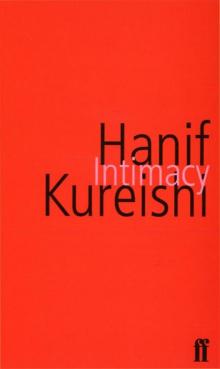 Intimacy
Intimacy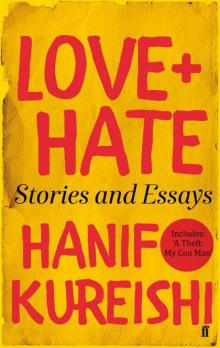 Love + Hate: Stories and Essays
Love + Hate: Stories and Essays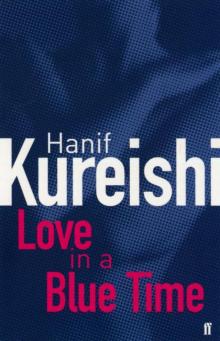 Love in a Blue Time
Love in a Blue Time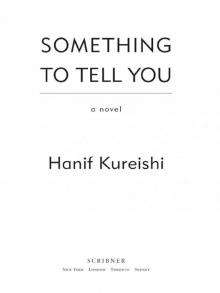 Something to Tell You
Something to Tell You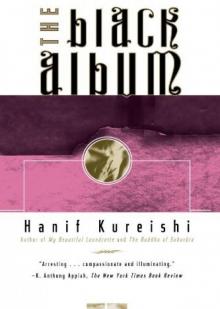 The Black Album
The Black Album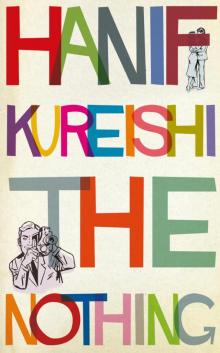 The Nothing
The Nothing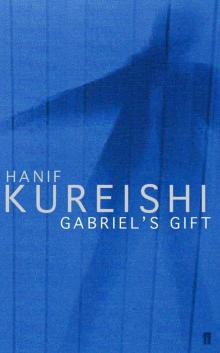 Gabriel's Gift
Gabriel's Gift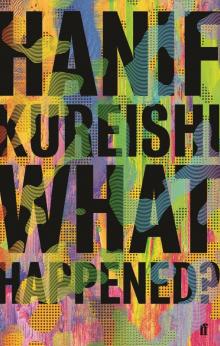 What Happened?
What Happened?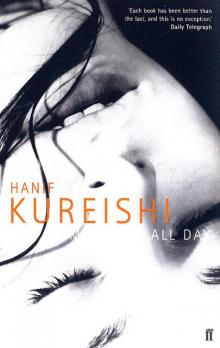 Midnight All Day
Midnight All Day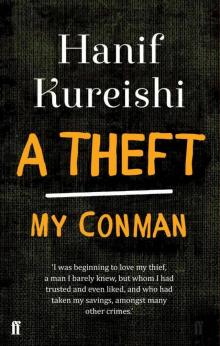 A Theft: My Con Man
A Theft: My Con Man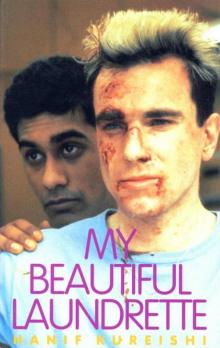 My Beautiful Launderette
My Beautiful Launderette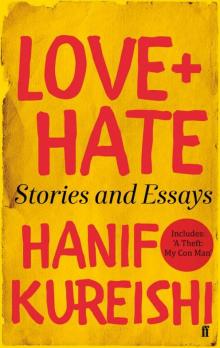 Love + Hate
Love + Hate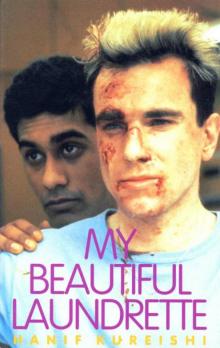 My Beautiful Laundrette
My Beautiful Laundrette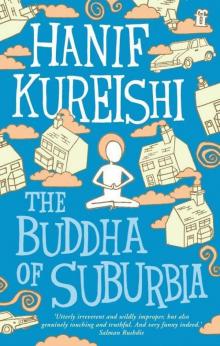 The Buddha of Suburbia
The Buddha of Suburbia